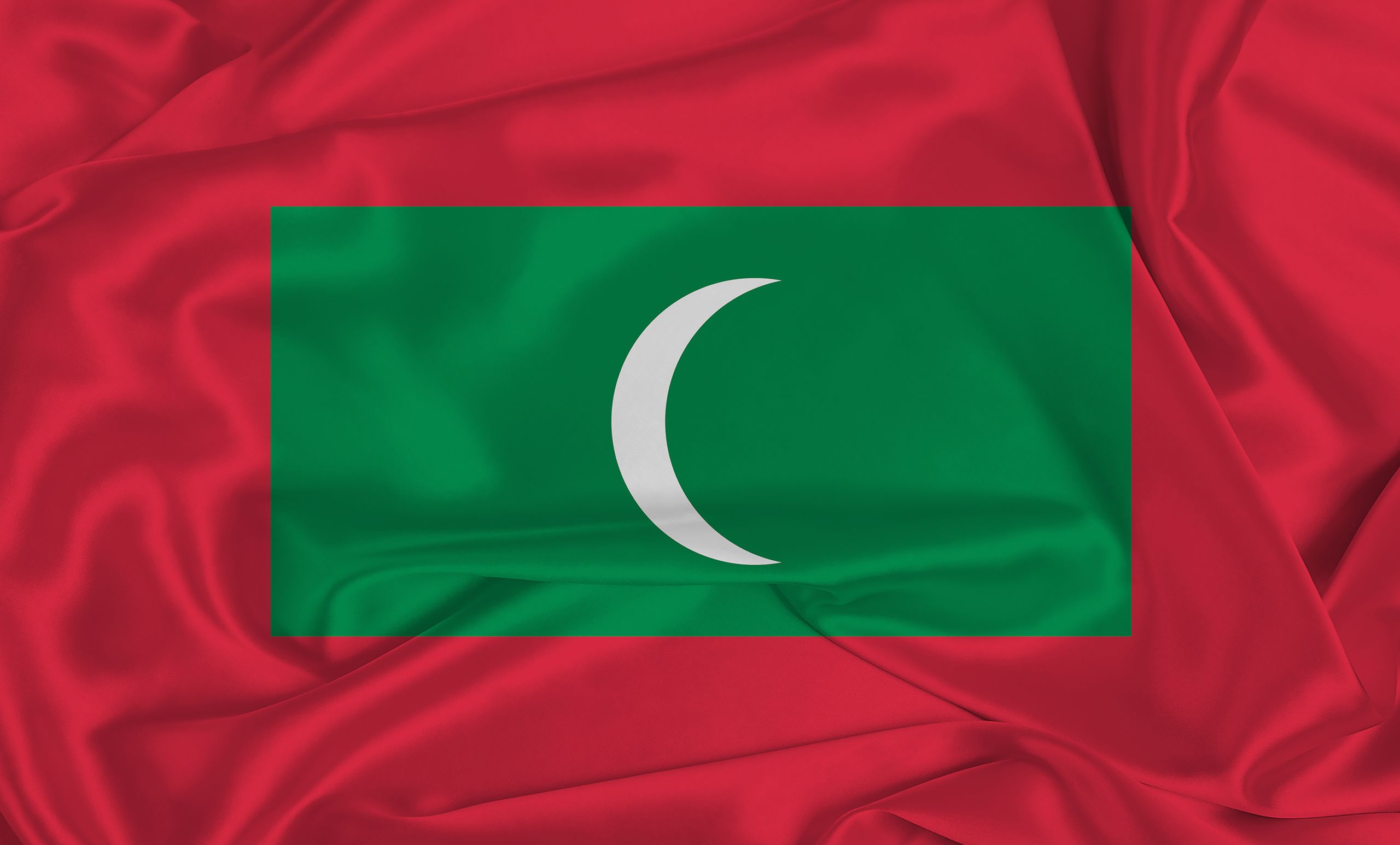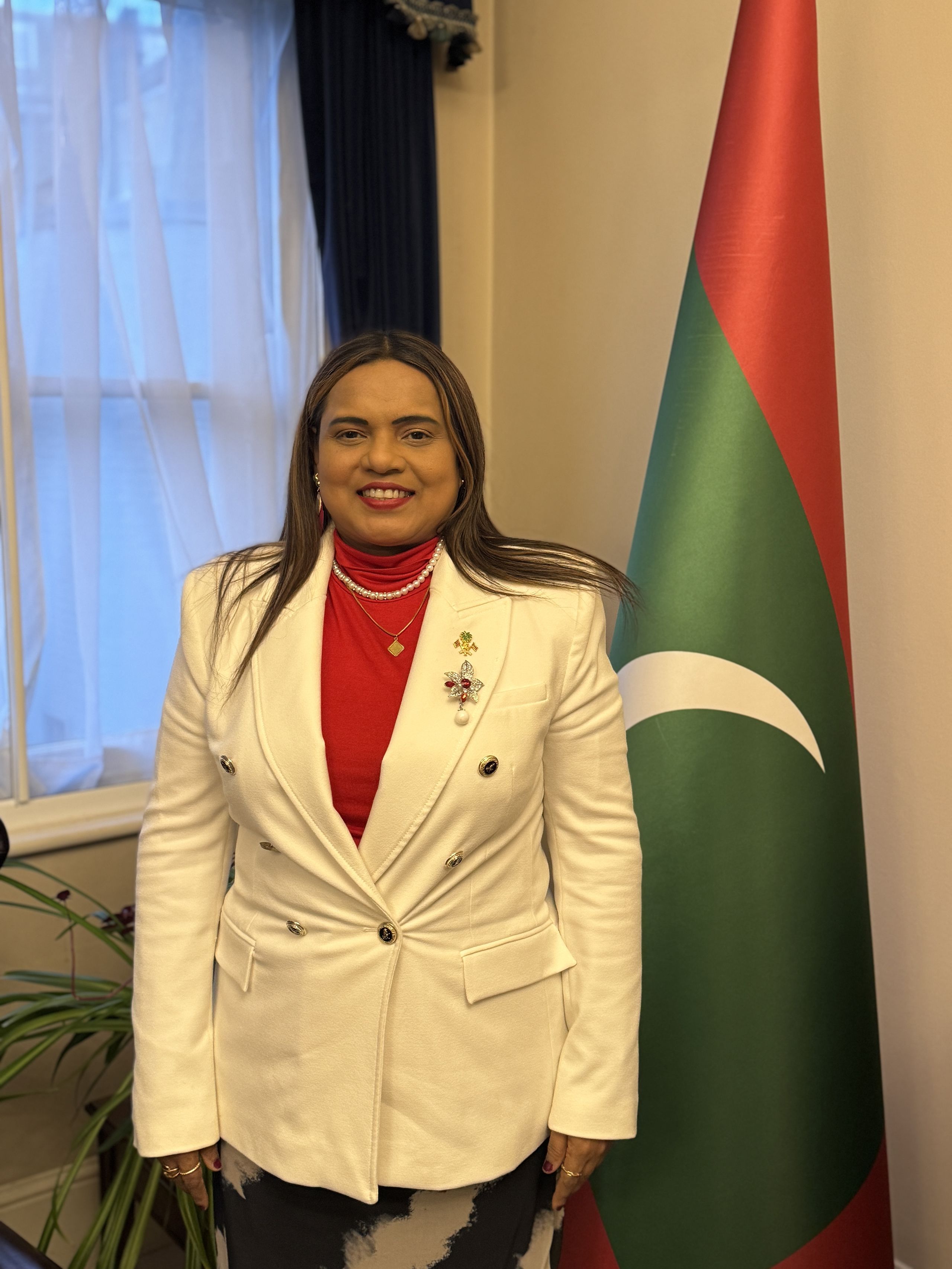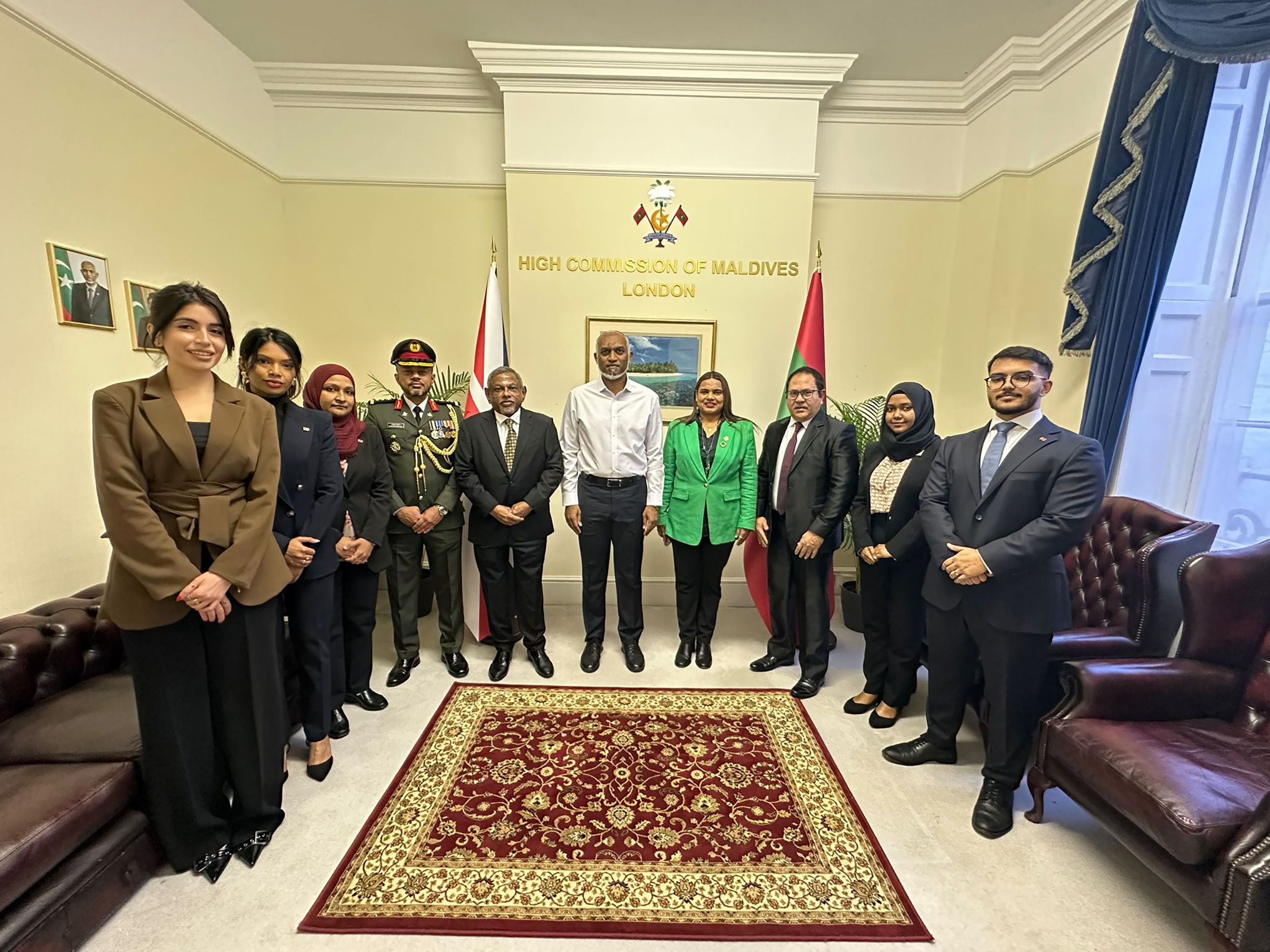Her Excellency
Dr Iruthisham Adam (‘Iru’)
High Commissioner of the Maldives

Welcome back to London. When did you arrive in the capital?
I arrived in London on 7 April 2024, and soon after had the pleasure of attending the UK Foreign Secretary’s Reception for High Commissioners and Ambassadors on Fitr Eid, and also Diplomat magazine’s Diplomat of the Year Awards Ceremony.
Coming to London feels like a true homecoming. I served my first diplomatic posting in London from 2002 to 2006 as Second and then First Secretary during a time when the Maldives’ government was challenged by opposition elements, plus domestic and international pressure to enforce a tourism boycott and democratic transition. Returning now as High Commissioner to the Court of St James is a great honour, and as a Chevening Scholar, this post holds both personal and professional significance. It is also a strategic post and duty-bound responsibility, and I’m prepared to build on diplomatic relations and promote our national interests. I am determined to deepen and expand diplomatic relations between the Maldives and UK through strategic partnerships on tourism, trade and tuna – the 3Ts. I hope to strengthen the High Commission’s consular services and networking with the Maldives students and diaspora in the UK.
Is there anything particularly interesting or surprising you have observed about your time in the capital so far?
London is always evolving, and returning after several years, I’ve noticed the city's energy, intense diplomatic activity and vibrancy. I appreciate the rich history, the British monarchy and tradition of warm hospitality at grand events such as His Majesty’s Address at the Opening of Parliament, Royal Ascot and Buckingham Palace banquets, as well as the British government’s greater emphasis on renewable energy and climate change. What has struck me most is how the British government is now even more focused on deepening relationships with the Commonwealth countries post-Brexit, as well as with South Asia and Indochina, which presents an exciting opportunity for the Maldives’ strategic location to enhance our diplomatic, economic, and cultural ties with UK and its partners.
Additionally, the diplomatic community in London is as dynamic as ever, with the city serving as a critical hub for trade, financial negotiations, and the pulse of international relations. This creates a unique environment for advancing global partnerships and addressing key global challenges.
Can you tell me about your family and upbringing? Do you think it influenced your choice of career in diplomacy?
I grew up with a strong sense of duty and public service, largely inspired by my father who served the government for 40-plus years, and my grandparents who dedicated their lives to serve the government and the people of Maldives in our Parliament. Their hard-won achievements and service had a lasting impact on me, and I was encouraged from an early age to take up roles that helped improve the lives of others. This, combined with my natural interest in global affairs developed by foreign affairs talks with former Prime Minister and first High Commissioner of Maldives to UK, the late Hon Ahmed Zaki – along with renowned longest serving Foreign Minister Uz. Fathulla Jameel visiting our family – led me to pursue a career in diplomacy, where I’ve had the privilege of representing the Maldives at various international negotiations.
Aside from the change in job title, how do you anticipate this posting to be different from your time spent at the mission between 2002 to 2006?
From 2002 to 2006, my work in London focused on promoting tourism and managing political relationships amid political unrest and democratic reforms in the Maldives. At the time, the High Commission in London was the key diplomatic presence for the Maldives in the UK, Europe and the Commonwealth, and we played a pivotal role in diplomatic engagement with stakeholders in the UK and the EU, also facilitating First Dialogue between the Maldives Government and Amnesty International and outreach to international media. As our only European diplomatic presence, the mission played a key role in communicating our national interests; our government commitments to civil, political, economic, and cultural rights, with pivotal support from the Commonwealth to prepare joining international human rights covenants.
Now, as the High Commissioner, my first objective is promoting our national interests at a time when Small Island Developing States (SIDS) like the Maldives are struggling with debt management, financing for development and vulnerability to climate change. Secondly, we must push President Dr Muizz “Maldives’ First Policy” foreign policy agenda – Sovereignty, Security and Development – from the Maldives High Commission in London. I intend to make all efforts to strengthen diplomatic and economic ties, promote climate action, and enhance people-to-people exchanges between the Maldives and the UK through accessible visa and travel arrangements. Following Brexit, the UK has established a High Commission in the Maldives and expanded our engagement and partnerships with the strategic partnership dialogue on mutual issues of cooperation like trade, tourism, and climate resilience, maritime and aviation security, as well as defence cooperation, while continuing to advance human rights and international cooperation.
What were the major issues you faced as the Maldives’ Ambassador in Geneva (2009-14)? It would be great to hear about the various roles you had during that time.
During my tenure as Ambassador in Geneva, the Maldives faced significant challenges in climate change diplomacy, human rights, and trade negotiations. I served as the Permanent Representative to the UN, WTO, and other international organisations, engaging in critical diplomatic efforts to advance the Maldives' global standing. A key achievement, in collaboration with the Foreign Ministry, was securing the Maldives' election to the UN Human Rights Council—a historic milestone as the first small state to be elected.
We also led initiatives to support Least Developed Countries (LDCs) and SIDS, establishing a trust fund to help these nations engage effectively in the Human Rights Council. The Maldives championed key resolutions on climate justice and women’s empowerment, contributing to the academic discourse on climate justice. Additionally, we played a pivotal role in WTO negotiations, advocating for smoother transitions for countries graduating from LDC to Middle-Income Country (MIC) status.
Another notable accomplishment was the establishment of the Commonwealth Joint Office in Geneva, which provided subsidised office facilities, enabling small states to maintain a diplomatic presence. These efforts underscored the Maldives' commitment to advancing the interests of vulnerable states on the global stage.
Can you tell us about your more recent experiences working as the Maldives Minister of Youth and Sports, and before that as the Minister of Health?
In my roles as Minister of Youth and Sports and Minister of Health, I led major reforms that had lasting impacts on the Maldives. As Minister of Youth & Sports (2016-18), I spearheaded a nationwide sports infrastructure development programme, launching over 400 projects on different islands. Under my tenure, I prioritised empowering youth through leadership programmes, the establishment of vocational training centres, providing essential equipment, and youth centres to ensure their active participation in nation-building. Promoting healthy lifestyles was a key focus, encouraging youth engagement in physical activities and wellness programmes.
As Minister of Health (2015-16), I introduced critical health reforms, including the establishment of the first-ever MRI service in a government hospital, expanding access to specialised health services. I played a pivotal role in achieving WHO certification for the Maldives as malaria-free and filariasis-free. Additionally, I enhanced the healthcare system by provision of ambulances and paramedic services for hospitals and health centres, improving transport and emergency response facilities across the country.

At the time, the High Commission in London was the key diplomatic presence for the Maldives in the UK, Europe and the Commonwealth, and we played a pivotal role in diplomatic engagement with stakeholders in the UK and the EU, also facilitating First Dialogue between the Maldives Government and Amnesty International and outreach to international media.
How will you bring your vast experience in academia to the role you have today?
My academic background has always complemented my diplomatic career, providing a deep understanding of international relations, climate diplomacy, and human rights law—essential in my work at the UN and other global platforms. My role as High Commissioner will benefit from my experience in multilateral diplomacy and holding key cabinet portfolios.
What are your main plans and priorities for your role as High Commissioner in the UK?
My priorities as High Commissioner include strengthening diplomatic and economic ties between the Maldives and the UK. One of the most important areas is enhancing trade, investment, and tourism. I will focus on deepening and expanding the diplomatic relations between the Maldives and UK through strategic partnerships on the 3Ts that I have already mentioned. I will be advocating the Maldives’ interests on global challenges such as climate change, where the Maldives is particularly vulnerable, and fostering cultural exchanges between the two nations.
The UK is not only the third-largest tourist market for the Maldives, but it is also a popular destination for Maldivian students pursuing education and research. Strengthening the relationship between the Maldivian diaspora and the government is a key priority, as I will serve as the first point of contact for the diaspora and act as a support agency for Maldivian students living in the UK. Education is especially important, and ensuring students have access to resources and guidance will be a central focus. The UK will remain a valuable partner, whether through consular services or providing support for families and individuals living here.
In the run up to COP28, what major climate issues are on the agenda for the Maldives?
The Maldives faces several pressing climate issues, which were at the heart of our agenda for COP29. We are deeply concerned with rising sea levels, which threaten the existence of our low-lying islands, and protecting our coral reefs, vital to our biodiversity and tourism industry. Transitioning to renewable energy and securing climate finance for both adaptation and mitigation efforts were also top priorities.
From the outcomes of COP29, we saw progress, but we recognise that much more must be committed and delivered to address the challenges we face. While the 300 billion commitments might not have been made, we remain hopeful and will continue to work towards securing climate finance. Overall, COP29 was a step forward, though we acknowledge that more action is needed to effectively protect vulnerable countries like the Maldives.
Do you think that the UK-Maldives relationship is changing or evolving following Brexit?
Yes, the UK-Maldives relationship is evolving in light of Brexit. The UK is seeking to build stronger ties with Commonwealth nations and partners, presenting a new opportunity for us to deepen our diplomatic, trade, and cultural relations. The Maldives stands ready to work closely with the UK to take advantage of this post-Brexit environment, particularly in areas such as tourism, trade, climate action, finance for development, education, and potentially even emerging sectors like AI. We look forward to formalising this cooperation through a strategic dialogue that strengthens our partnership in these key areas.
What do you think is currently the Maldives’ greatest diplomatic challenge?
The Maldives' greatest diplomatic challenge is addressing the existential threat posed by climate change. As a small island nation, we are acutely vulnerable to rising sea levels and extreme weather events. Another challenge is balancing our diplomatic relationships with major powers in the Indian Ocean region while also promoting sustainable tourism and protecting our fragile environment.
Additionally, advancing our economic development while preserving our natural resources for future generations remains an ongoing challenge. The government has inherited significant loans from previous administrations, necessitating urgent attention to managing debt and addressing standing payments. This includes implementing fiscal adjustments and managing government expenditure effectively to ensure long-term stability and growth.
Another critical issue is the Maldives’ foreign exchange and resort industry. The country has faced challenges in stabilising the dollar rate, which directly impacts the economy. Ensuring that revenue from resorts benefits the broader population, rather than solely the elite, is a priority. It is crucial that the wealth generated from the tourism sector is used appropriately, fostering Maldivian investment and supporting the people, so that economic growth is inclusive and sustainable for all citizens, not just a select few.
High Commissioner Adam with the President of the Maldives HE Dr Mohamed Muizz and the team at the High Commission
High Commissioner Adam with the President of the Maldives HE Dr Mohamed Muizz and the team at the High Commission
What has been the most memorable day or event of your career to date?
There have been many memorable moments in my career, but one that stands out is when the Maldives was elected to the UN Human Rights Council for the first time in 2010. As the first female Ambassador to the UN offices in Geneva, and the first female Ambassador from the Maldives’ diplomatic service, I was honoured to represent my country at this significant moment. It was a testament to the Maldives’ growing influence on the global stage and its commitment to human rights.
Another memorable moment was playing a landmark role as President of the Copenhagen Climate Summit, where the Maldives represented AOSIS, CVF, and SIDS countries. This powerful position allowed us to advocate for the most vulnerable nations in the face of climate change, reinforcing the Maldives' credible reputation and identity on the global stage. One of the highlights of my life was the moment President of Maldives, HE Dr Muizzu, appointed me as the High Commissioner to the United Kingdom – a role that allows me to further strengthen these important ties and build on our shared history and future opportunities.
Are there any hobbies and interests that you enjoy and why?
I am passionate about culture, particularly the arts, travel, and literature. During my time as Minister of Youth and Sports, I promoted cultural exchanges and initiatives to nurture Maldivian talent in the arts and preserve our cultural identity through public diplomacy. These efforts remain close to my heart. I also enjoy reading and staying informed about global affairs, particularly on climate change, diplomacy, and international human rights, as these subjects inspire my work.
Diplomacy is a particular passion of mine, as I value the opportunity to engage with people from diverse backgrounds and walks of life. Meeting individuals from different cultures and perspectives enriches my understanding of the world and informs my approach as a diplomat.

